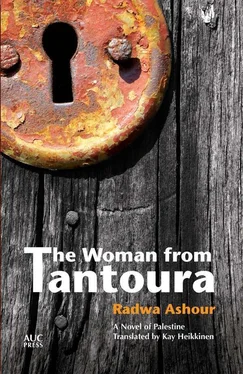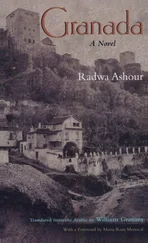“We’ll eat and then we’ll go to the madafa.”
“You won’t die of hunger; follow me to the madafa. After that you can eat however you like.”
The madafa in the headman’s house was where the men met to talk, to spend the evening in company, to discuss recent events and sometimes to solve disputes; and there the men sat in a circle around the radio to listen to the news. Women did not enter the madafa and the only news that reached them was what the men kindly told them, which they then exchanged among themselves. When it all happened the roof collapsed on everyone’s head, with no difference between the men and the women, the old and the young, or even the nursing infants dependent on their mother’s milk for their very life. I said there was no difference; I take that back, and I look at it again. There was a difference. Yes, there was a difference.
A few weeks after my mother’s joyful trill and the slap that followed it, the refugees arrived in the village. Qisarya was located on the sea like us but it was south of town; it fell and the residents were forced to leave, and our village hosted some of the families. Our share of the guests was a widow with two children, a four-year-old boy and a girl a year younger than I. My new friend Wisal, the first of the refugees I met, told me about the scenario that all of the coastal towns, and others, would live through three months later. The scenario was not identical in every detail but it was the same in the general outlines. My friend told me that the Jewish troops laid siege to the town, attacked it, and drove the people out of their houses.
“My mother said, ‘Where will we go? We have no one to support us, no one who can take us to another town or arrange a way for us to live.’ She insisted on staying in the house. We stayed, and we learned that others did as we did. A week after they entered the town, they took us out of the houses and destroyed them and forced us to leave. They did the same with the Muslims and the Christians.”
I found that strange, and I asked, “Are there Christians in your town?”
“Yes, Muslims and Christians and Jews.”
“And Jews?”
“Yes.”
“In the ‘company,’ or in the town?”
“In the town.”
“Many?”
“No, a few.”
“Did they drive them out?”
“They came to give them the village, so why would they drive them out? Are there Jews in your village?”
“There was one man, then he moved to Zummarin, their ‘company’ in Zummarin that’s called Zikhron Yaakov.”
“Is it large?”
“Oh yes, it’s large. East of the village. It’s about an hour’s walk away.”
“They built a ‘company’ in our town too, they can get there in a ten-minute walk. They built it in the town territory, on farmland. They built it a few years ago; its name is Sdot Yam. I haven’t visited it.”
“I haven’t visited Zummarin either, but my father visited it, because there was a problem, and the police station and the government are there. There are people in the village who sell fish there and sometimes eggs, and sometimes they buy clothes there because they’re cheap. But my father says that since the big strike in ’36 there has been a decision: we will not sell to them or buy from them. Sometimes they come to swim in the sea. Or there’s a problem, so the headman of the ‘company’ visits the headman of the village. When will you go back?”
“My mother says we’ll go back soon. I don’t believe her.”
I introduced my friend to the girls of the village. I took her to the Sugar Spring and the Newlyweds’ Beach and the islands and the castle built on one of them. She did not find it wonderful. She said, “Our village is bigger. The houses are bigger and there are more streets and we have more gardens. And we have ruins.”
“There are ruins in our village too!”
I took her to the tower to see for herself.
She didn’t wonder at it. She said, “We have more and better ruins. Marble pillars as white as milk and known for their strange color, like smoke. And if you dig in the sand you’ll find tiled floors and pictures, as if the inside of the earth were built and paved and decorated with pictures.”
“How’s that?”
“Once a young man from our town dug and found a colored drawing of a swan, made of small stones stuck together. After that he said to the young men, ‘Dig more,’ and they found pavings with pictures of pelicans and ducks and flowers and tree leaves, in colors. One of the old men of the town said that these are ruins from the time of Byzantium and maybe before, and no one knew the meaning of ‘the time of Byzantium.’ The old man told them that there must be important finds among them, and if the Jews knew about them they would take the village. So no one saw anything and no one knew — they kept it quiet.”
“In our village too, there’s a good swimmer who said he dove into the sea and found a big ship, not one of the new ships that broke on the coast but an old ship, with strange colored things in it. He didn’t tell anyone but my brother and my brother told me, and I haven’t told anyone but you. Maybe that’s the reason they didn’t come to our village.”
“By God we didn’t tell anyone and we didn’t inform them, but they came into the town and occupied it.”
She looked as if she was about to cry. I said, “When you return safely I’ll come and visit you there.” Then I amended, “If Yahya allows me to.”
“Who is Yahya?”
I smiled. “The groom, from Ain Ghazal. His father and uncles came and asked for me four months ago, and they recited the Fatiha with my father.”
“When is the wedding?”
“My father said, ‘Let her reach fourteen before we write the contract.’ Yahya is studying in Egypt, in Cairo, have you heard of Cairo?”
I said it proudly, emphasizing the word “Cairo” by repeating it and pronouncing it on a higher tone that the rest of the words, anticipating that my friend would be impressed.
She didn’t look impressed. She said, “I won’t get married until after we go back home. How could the proposal happen … and where would we receive all the important family members, when we are like this, without a home?”
The proverb of my mother’s was right: February is fickle and stubborn, it huffs and puffs and has the smell of summer.
And what a summer!
My father, like the rest of the men of the village, listened to the radio in the madafa. I never saw this apparatus as I was not allowed into the madafa except as a little girl, and the radio had not yet arrived then. But I would hear my father saying to my mother, “I heard such-and-such on the Jerusalem broadcast, Cairo radio announced such-and-such.” Or he would comment on what my brothers told him, saying, “It’s strange that they didn’t announce that on the radio.”
On their next visit after the episode of the slap, at my father’s request, my brothers brought with them two big cardboard boxes. He opened the first and took out a large wooden apparatus and placed it in the front part of the house, near the entrance. Then he opened the second and took out a black box, which he said was the battery; the radio doesn’t work without it. He connected it to the apparatus and then turned a button on it and a sound came out of it. He sighed in satisfaction and said, “Now I can listen to the news every morning in peace.”
The apparatus seemed exciting because of its large size and because of the noises that emerged from it: a strange crackling and then the clear voice of someone speaking, as if he were with us in the house. At first my mother was confused, and then she adjusted her scarf on her head, as if it were likely that the voice of the strange man which had suddenly entered the house meant that he was present in it, and could see her. After that came a woman’s voice, singing. My father cut her off with a movement of his fingers, turning a button on the apparatus, and she was followed by another man, speaking.
Читать дальше












